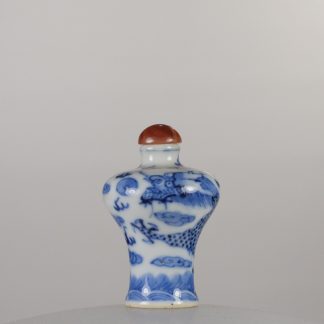Description
Description: Chinese porcelain snuff bottle of flattened bottle form, decorated in underglaze cobalt blue with a fisherman and a boy/young man, both seated under a tree at the bank of a river or a lake in a mountainous scenery. It is worth to note that the scene here is different from that of the usual “fisherman” snuff bottles, where the subject is always represented by a solitary fisherman (see for example the ceramic snuff bottle C22). Here we have two figures, and by looking at their faces it is evident that the fisherman is an old man (moustaches, and a short beard) while the other figure is a young one. This means that the scene is representing a scholar while fishing and his attendant; in fact, the young man has something on his lap, which most probably is a qin. It is known that scholars had a special appreciation for fishing (see the Notes below). This is the only bottle that we have seen where the connection between scholars and fishing’s activity is so explicit.
The shape of this bottle is a further feature that makes it quite uncommon. All the b&w “fisherman” bottles that we have seen up to now are of cylindrical shape, like the bottle C22.
Mark:
Dating: 19th century
Material: Porcelain, decorated in underglaze cobalt blue.
Size: 71 mm high
Stopper: Agate stopper with stained bone spoon
Provenance: Ex Francesco Villicich collection
References:
Notes: Extract from “Fishing expresses aspiration, spiritual freedom in ancient China.” An article from “Chinese Social Sciences Today”:
“A lonely fisherman afloat and angling in the snowy weather demonstrates the harmony between humanity and the nature in Chinese culture. Fishing provided a means for ancient Chinese scholars to pursue harmony between humanity and nature. It also provided a theme for them to communicate their feelings in literature.
Ancient Chinese scholar-officials have cherished fishing as a pastime since the dawn of recorded history. Whether they served in the imperial court or lived a free life among the mountains and forests, Chinese scholars would often take time, sitting by a quiet lake or a stream with a fishing rod, and enjoy the fun of fishing. Fishing brought fun to literati and sparked inspiration in literary creation. As a way to express their aspirations and feelings, angling provided a means for ancient Chinese to pursue harmony between humanity and the nature. Chinese scholars developed a strong affection for angling and used it as a metaphor for various feelings within literary works, elevating fishing to a cultural pursuit.
Meng Haoran, a famous poet in the Tang Dynasty wrote two well-known verses: “Sitting by and watching those fishermen, I have nothing but envy at the fish (they caught).” The fishermen symbolized the rulers and governors of the nation. Envying their fish was a metaphor about his being eager to serve in the imperial court and benefit the nation. Solitarily and silently fishing by a river, the scholars isolated themselves from their worldly reputation and interests, maintaining their free and independent personality. By doing this, they were able to rise unsullied from the mud and maintain their spiritual freedom.
Liu Zongyuan (773-819) was banished from the court to Yongzhou after his participation in the failed Yongzhou Reform. There he wrote one of the most famous poems about fishing, which included the line: “From hill to hill no bird in flight; from path to path no man in sight. A lonely fisherman afloat; fishing snow in a lonely boat.” This poem was a manifesto that Liu wrote to his political opponents and the world. The fisherman became integral part of heaven and the earth. The poem best describes an image of a free spiritual world beneath the solitary exterior.
When the political environment severely conflicted with moral principles, some scholars would choose to abandon their positions in the imperial court and pursue spiritual freedom. They would prefer to be an unknown fisherman floating on the rivers and lakes. They took the gentle breeze and bright moon as their companions and the elk, fish and shrimp as their friends. Fishing with a lonely fishing rod between the heaven and the earth, these scholars gained enormous spiritual freedom and joy.”













Reviews
There are no reviews yet.